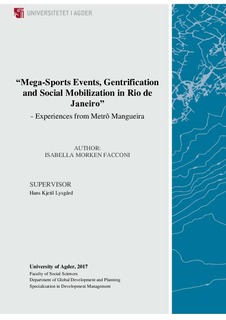“Mega-Sports Events, Gentrification and Social Mobilization in Rio de Janeiro” - Experiences from Metrô Mangueira
Master thesis
Permanent lenke
http://hdl.handle.net/11250/2493188Utgivelsesdato
2017Metadata
Vis full innførselSamlinger
Sammendrag
In order to promote gentrification of the city of Rio de Janeiro, the Brazilian government and
the municipality of Rio de Janeiro have actively used Mega-Sports Events (MSE) in urban
planning. Examples are tax cuts and the legalization of various measures for large-scale urban
programs, to prepare the city for hosting these prestigious events. Whilst trying to fulfil the
obligations from MSEs, the host city denies its citizens access to democratic participation and
thereby their right to the city. The promises made to the international sportive federations
regarding upgraded infrastructure, sportive arenas, media coverage and security have created
enormous pressure on the city’s politicians. Thousands of families have been evicted from their
homes to create space for urban projects. Many of these have been offered housing by ‘Minha
Casa Minha Vida’ on the outskirts of Rio de Janeiro, far away from work and education
opportunities. In response to the forced evictions, the urban poor have resisted and several
mobilizations and protests have occurred in Rio de Janeiro since 2009.
Favela dwellers from Metrô Mangueira were first threatened by forced evictions in 2010 due to
the upgrading of Maracanã and around for the World Cup in 2014. The authorities offered the
residents housing through ‘Minha Casa Minha Vida’ in Cosmos, approximately 70 km away.
The residents refused and created a community committee to lead the mobilization. The
Committee of Metrô Mangueira created vertical and horizontal linkages with public defenders,
the State University of Rio de Janeiro, international media and other favelas in similar
situations. Several times during the resistance activities at Metrô Mangueira, there were brutal
encounters between the residents and the military police, and the international media focused
attention on the unfair treatment the residents of Metrô Mangueira had to suffer as a result of
the World Cup preparations.
Despite being denied participation in the planning process by means of active citizenship and
the use of invented spaces for participation, the residents of Metro Mangueira succeeded in
attracting the authorities’ attention towards their claims. After two years of struggles, the
residents of Metrô Mangueira got housing in Mangueira. The social mobilization at Metrô
Mangueira created an insurgent citizenship that fight for a right to the city. The success of this
social mobilization has been of great importance even after the fading of the mobilization itself,
with other collective actions building on this and other similar precedents.
Key words: Mega-sports events. World Cup. Olympics. Urban Planning. Gentrification. Social Mobilization.
Citizenship. Insurgent citizenship. Invented Spaces. The right to the city. Minha Casa Minha Vida. Favela
Beskrivelse
Master's thesis Development management UT503 - University of Agder 2017

